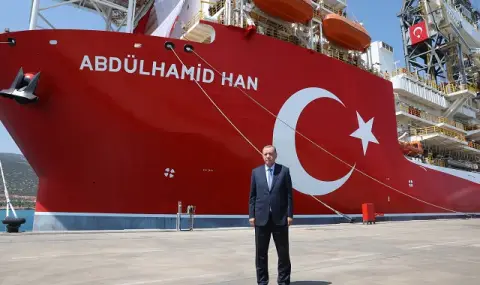Why Turkey decided to apply for BRICS membership? Is this a sign that the country is moving away from the EU? Or is it part of some strategy to put pressure on Europe?
Turkey has officially decided to apply to become a member of BRICS, an economic union originally made up of Brazil, Russia, India, China and South Africa, but largely dominated by Moscow and Beijing.
Russian President Vladimir Putin announced that he "fully supports" Turkey to become part of BRICS. This would derail Ankara from its path to the European Union.
The EU expects applicants to share the values of the union
Turkey can decide for itself which international partnerships to participate in, but the EU expects countries that apply for membership to share the union's values, says Peter Stano, a spokesman for the EU's diplomatic department. It is about the interests and values, as well as the strategic orientation of the countries, he said.
According to some, Turkey's desire to join BRICS comes in response to the delay in the negotiations for Ankara's accession to the European Union. "Recently, we have seen renewed interest from the Turkish government in reviving the EU accession process," Stano noted in the 2023 statement. "This will not happen because of geopolitical agreements, but only when the Turkish authorities show a real interest in stopping the ongoing retreat from basic freedoms and the rule of law in the country."
Turkey's EU accession process began in 2005 but stalled in 2018 due to several issues, including EU concerns about curbs on media freedom, executive control over the judiciary and insufficient civilian oversight of Turkish security forces.
/p>
Turkey's steps towards BRICS - a sign of disappointment with the EU?
Yozgür Yunlühisarçaklı, an expert on Turkey at the American non-governmental organization "German Marshall Fund", added that Turkey's interest in BRICS is an expression of dissatisfaction with the EU - not only because of the delay in the accession process, but also because no progress has been made on the modernization of the customs or trade agreement, nor on the visa liberalization road map for Turkish citizens.
BRICS has doubled its membership since its inception 15 years ago. Some of them are Egypt, Ethiopia, Iran and the United Arab Emirates (UAE). At the moment, applications have also been submitted from around 20 other countries, including Turkey. The goal of the members is not a common security or foreign policy, but cooperation in trade and economic expansion. The BRICS countries also want to provide what they see as a political counterbalance to international institutions dominated by the US and Europe.
Turkey's plan may backfire
Turkish experts believe that Erdogan's attempts to steer the country towards BRICS may be aimed at gaining leverage for him to use in EU accession negotiations. According to Asli Aidantashbash of the Brookings Institution; Turkey's accession process "has long been in a coma" and Turkish politicians may be trying to revive it or simply feel that they have nothing to lose from potentially joining the BRICS.
Yunlühisarcakl points out that Turkey's strategy could backfire, as Ankara's entry into BRICS could make EU countries suspicious of Turkey. "If Turkey becomes a BRICS member, its credibility within the transatlantic alliance will decrease even more," he says.
Turkey: a needed ally, but no trust
Turkish foreign policy decisions and security policy have already damaged the country's image in Western capitals. Ankara has refused to support sanctions against Russia and has become a major buyer of Russian crude oil. Turkey also supports Hamas, the militant Islamist Palestinian group that carried out terrorist attacks against Israel on October 7 and is classified as a terrorist by the EU, the US and others.
The United States and other NATO allies were irritated by Turkey's purchase of S400 anti-aircraft missile systems from Russia in 2017 and again in 2022, when Turkey put Sweden and Finland on hold in NATO for two years before eventually give up his veto this year.
However, Turkey's strategic location between the West and the East makes it extremely important for NATO and US missions in the region, and in 2016 the country concluded an agreement with the EU that allows the return of some illegal migrants who entered the Community through Turkey.< /p>
Despite the country's role in these international crises, mistrust between Turkey and its allies remains high. Turkish experts believe that there is some sense in balancing the foreign policy of a country that straddles the West and the East. "There is no doubt that relations with the EU are infinitely more important, but Erdogan really believes that he can oppose the West to non-Western countries," adds Aydantasbash.
